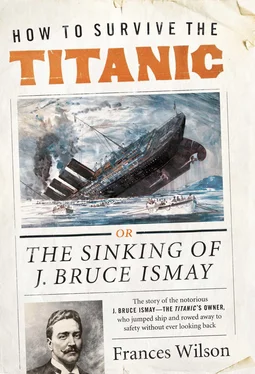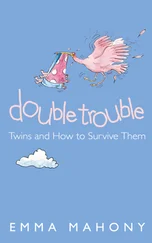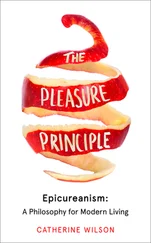Chapter 6
THE SECRET SHARER
A man always has two reasons for the things he does: a good reason — and the real reason.
J. Pierpont Morgan
A man’s most open actions have a secret side to them.
Joseph Conrad,
Under Western Eyes
Florence Ismay and the children were on a motoring holiday in Wales when they heard that the Titanic had sunk. They returned to Liverpool straight away and on Wednesday 17 April, Florence wrote her husband a letter.
My darling Bruce,
It seems an eternity since last Monday night when I first heard that the Titanic had met with an accident. We reached Fishguard about 6.30 and there got telegrams from the Office and from Margaret [their eldest daughter] saying that there was a report that the ship had struck an iceberg, but no lives lost, and that she was proceeding with two other liners to Halifax. Of course I was full of sorrow at the thought of the splendid vessel but felt no real anxiety until the next wire about 10.30. That was followed by another at 3.30 which made me terrified for your safety. Words fail to describe the horror and anxiety of the hours that followed. It seemed an eternity.
Oh darling, what that time must have been like to you. When I think of the anguish you must have been through it makes me tremble even now. Thank God. Thank God that you have been spared to us. My life would have been over if you had not been saved. For me there never has been and never could be any man but you and I feel I can never express the gratitude and thankfulness that fills me for your escape… I have wished many times since Monday night that I had gone with you, I might have helped you in this awful hour. I know so well what bitterness of spirit you must be feeling for the loss of so many precious lives and that thing itself that you loved like a living thing. It must have been ordained by Providence as every precaution human skill and care could devise had been done. We have both been spared to each other, let us try to make our lives of use in the world. My dearest, if I have you I feel no trouble or sorrow can be unbearable, and that these last 48 hours that we can never forget may yet in some unknown way be turned into good… 1
This is possibly the first love letter that Florence has ever sent, and she reveals her feelings for her husband as though they are a secret she has harboured for years. She can hardly bear what he has been through; it is pure providence that he is still alive, that their marriage has been given a second chance. Bruce, who has never before shared anything with his wife, will now need her to help carry his load. She has forgiven him the errors of the past; they will start their lives together again and this time do it differently; they will make themselves of use to the world and approach each day with gratitude and generosity. Most of all, they will now talk to one another, the decades of silence are over. Bruce is due to retire soon anyway: he will leave the sea for good, they will no longer need to be apart. And this might indeed have been their story, had Ismay not found a secret sharer in Mrs Thayer.
The Titanic ’s maiden voyage has always conjured up images of ill-fated lovers. Whether it is the ship and the iceberg in Thomas Hardy’s poem, or Jack and Rose in James Cameron’s film, the story is one of convergence. When Ismay and Marian Thayer first encountered one another we don’t know; they may have met through friends in New York but it is more likely that they met at sea and consolidated their relationship on board the Titanic. Ismay was at his most relaxed on his ships and the Thayers frequently crossed the Atlantic on White Star liners. In his account of the wreck, Marian’s son, Jack Thayer, said that he and his father spent a good deal of time talking to Ismay on the Titanic, that during the voyage they got to know him ‘well’. Friendships which would never form on land blossom on board ships where the usual bounds and restrictions are suspended and passengers and crew exist in a zone between time and place. Conrad’s talk on board the Torrens ‘fascinated’ Galsworthy and Sanderson; his ‘rare personality attracted us at once’; Ismay’s attraction to Mrs Thayer’s talk and rare personality was also immediate. She was the most sympathetic woman he had ever met.
Marian Thayer belonged, like the Astors and the Guggenheims, to Scott Fitzgerald’s enchanted world of East Coast money. From impeccable Philadelphia stock, she had married John Borland Thayer, ten years her senior, on her twentieth birthday. Before taking on the Vice-Presidency of the Philadelphia Railroad, Thayer had been one of the state’s premier cricket players. Three months before the Titanic set sail, Mrs Thayer’s presence at Philadelphia’s First Assembly Ball had drawn the usual press attention. This was ‘the Prime Social Event of the Season’ and the lovely Marian Thayer was ‘one of the most strikingly costumed women’ of the night. She wore, according to Women’s Wear Daily, a high-waisted white satin gown with long train and a ‘gauzy overdress, heavily spangled with gold’. Her slippers were also gold, and her thick dark hair shone in coils around her head. In love with her husband, devoted to her four children — the youngest of whom, Pauline, was eleven when the Titanic went down — and loyal to her friends, Marian Thayer was the image of contentment but seemed also to understand unhappiness, and this was her appeal. Her husband may have suffered from bouts of melancholia; he was periodically described in gossip columns during 1910 and 1911 as being unwell and in need of rest, and the Thayers visited ‘nerve doctors’ in Switzerland. It was typical of Mrs Thayer to have insisted on the grief-stricken Emily Ryerson’s taking a walk with her on the deck of the Titanic the afternoon that they met Ismay; the grieving and the troubled gravitated towards her and she drew them in. Graceful and low-voiced, she shirked the superficiality of groups, preferring the intimacy of one-to-one conversation. She was a collector of life stories; people talked to Mrs Thayer as they would to no one else. She soothed the lonely with her promise of friendship, she reassured the bereaved with her belief in an afterlife. There was no pain that Mrs Thayer apparently could not take away.
The night the Titanic went down, the Thayers had been at the dinner for the Captain hosted by their friends George and Eleanor Widener. Other guests included William Carter, who jumped into the same lifeboat as Ismay, Carter’s wife, Lucille, who would divorce him on account of it, and Major Archie Butt, the trusted aide of President William Howard Taft. During the evening, while Ismay was dining with the ship’s doctor on the other side of the room, Mrs Thayer locked herself in private talk with Major Butt, who was returning on the Titanic from a European holiday which the President had advised his ‘dear Archie’ to take.
Six days later she described their conversation in a letter she felt ‘compelled to write’ to the President. ‘In my own grief’, Mrs Thayer began, ‘I often think of yours.’ She addresses the most powerful man in America as a fellow suffering being. ‘I feel I must write to tell you how I spent the last Sunday evening with Major Butt — for we all cherish news of last hours — and we spoke much of you. How devoted to you he was, and oh what a lovely noble man he was!’ Her meeting with Major Butt was ’meant to be’, Mrs Thayer says; he ‘opened his heart to me and it was as though we had known each other well for years’. This was the first time that she had ever spoken to Major Butt, but ‘from the moment we met [we] never turned from each other for the rest of the evening’. She felt ‘as though a veil was blown aside for those few hours illuminating distance between two who had known each other always well long long before and had just found each other again — and I believe it’. While the rest of the room discussed the stock exchange and crossing speeds, the society wife and the forty-six-year-old bachelor were ‘opening our innermost thoughts to each other’. He spoke of his love for his mother (‘he told me I was just like her’) and his sister-in-law, Clara, to whom he wrote every day about his life in the White House with Presidents Roosevelt and Taft, letters which were later published. He spoke of his ‘love’ for the President and of ‘someone else he loved but that I do not’. They made an engagement to meet again the next day, ‘as I was going to teach him a method of control of the nerves through which I had just been with a Swiss doctor, knowing it would be a very wonderful thing for him if he could get hold of it for he was very nervous and did not know how he was going to stand in the rushing life he was returning to, and we were going to work so hard over it the rest of the time on board’. She ends by asking if the President thinks there is ‘any chance of seeing my husband or [Major Butt] again here in this life? My reason tells me No but how can we give up all hope until some days yet go past of this cruel torture?’ 2
Читать дальше












